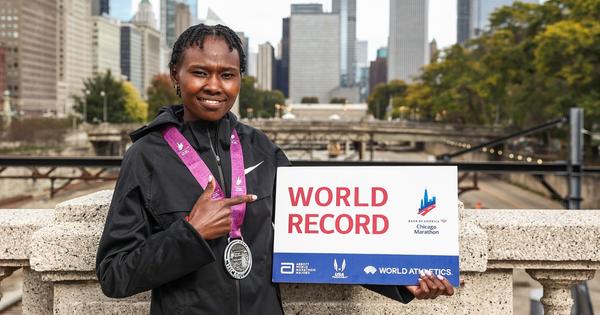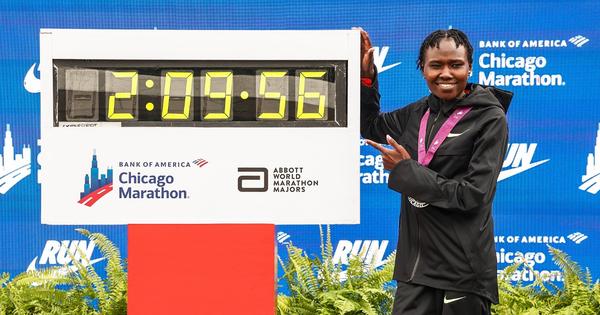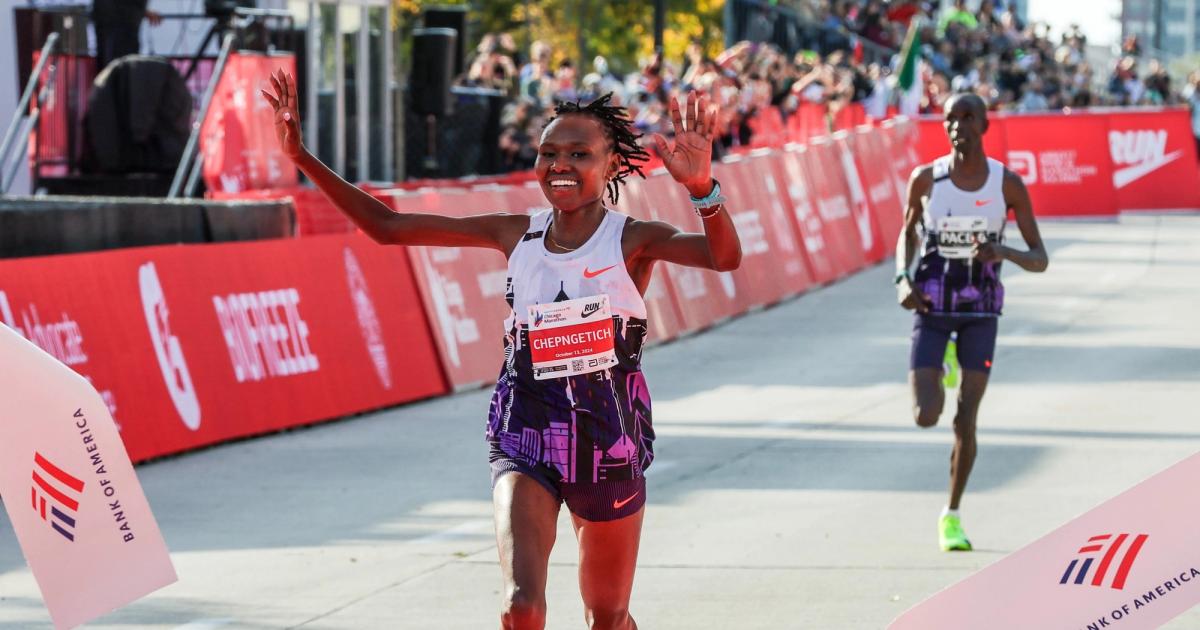By Paul Snyder
July 23, 2025
Back in October of 2024, fresh off Ruth Chepngetich running an implausibly fast 2:09:56 Chicago Marathon in which she finished 11th overall, we concluded our thoughts on the performance by saying: “So while 2:09 seems crazy for now, it might end up feeling a lot more normal very soon.”
Nine months later, 2:09 still seems crazy—one might even say unbelievable. Nobody has come close to matching that time. And it was not normal! Mid-last week, news broke that Chepngetich has been provisionally suspended by the Athletics Integrity Unit after a positive test on March 14th for Hydrochlorothiazide, a masking agent, per WADA.
While this bust probably didn’t surprise all that many people, it certainly sent shockwaves of gloom throughout the sport. As a fan (or competitor) how do you absorb this news without spiraling into doomerism?
Chepngetich getting caught with 190x the minimum reporting concentration of a powerful diuretic suggests that she and her team were risking her health to conceal the use of actual performance enhancers. Oh, and about her team… Chepngetich says she is self-coached and, while a Nike athlete, does not represent a particular training group. She’s represented by Federico Rosa, an agent associated with at least six other high-profile athletes who have or are actively serving doping bans.
Surely the buck doesn’t stop with Chepnegetich? It’s not entirely unreasonable to dismiss every pro as filthy, and assume the whole enterprise is rotten, top to bottom—only suckers think anyone could run that fast without a little pharmaceutical assistance.
Sure you could slap on a tinfoil hat and spend your time compiling vibe-based “CLEAN WORLD RECORD LISTS.” But given that you’re here, reading thousands of more laudatory words about track, we’re assuming you’ve got a bit more hope, or at least want to believe that there’s some integrity remaining in the sport. So to you, we want to offer the following spin: the system worked.
An athlete who was (allegedly!) using illegal substances was caught relatively shortly following a hard-to-believe performance and was provisionally suspended within a year of the mark. Ideally, she’d have been caught before crossing the finish line in Chicago and that her positive test would trigger an invalidation of the record (which will likely still stand even if her provisional suspension holds), but here we are.
We’re not encouraging you to bury your head in the sand. As long as there has been sport, there have been people cheating in sport. It’d be naive to assume a high-profile athlete won’t get caught with their hand in the diuretic cookie jar again. But the point remains: they do get caught! Probably not every cheater, certainly not every time. But plenty get nabbed, and you have to assume that when it happens, other nefarious-doers clean up their act, at least for a bit.
The clean athletes who finished behind her are probably looking at their lesser bank accounts and not taking much solace in this outcome, nor should they. It’s not a perfect system, but as of now, it’s the best one we’ve got.
Chepgnetich’s case and the outrage it triggered will hopefully also lead to more substantive conversations about how World Athletics, the World Marathon Majors, sponsors, and other well-heeled stakeholders with power can do better. Simply having the ability to look up Chepngetich’s agent on the WA database and draw our own conclusions is a transparency measure that hasn’t always been available, and there are many additional steps WA can and should consider to protect clean sports.
It’s easy, logical even, to despair. But if you care about track and field, you owe it to yourself and the sport to believe that there’s honor in clean competition. The upside to the demoralizing frequency of AIU press releases is that there are a lot of them—there are more suspensions in track and field now than ever before because there’s a lot of testing going on.
The best case scenario is that gold medals and big checks go to the fastest clean athlete on the first try. The next best is to make sure that the right athletes ultimately get their due—even if it takes years. And to not aim for either of those two goals at all is a white flag of surrender that we’re not willing to wave.

Paul Snyder
Paul Snyder is the 2009 UIL District 26-5A boys 1600m runner-up. You can follow him on Bluesky @snuder.bsky.social.




